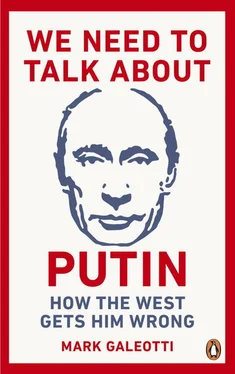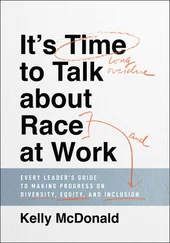But the paradox is that on an individual level, Putin, a man who doesn’t seem to make close friends easily, is actually very loyal to his own. This does not just mean turning a blind eye to their corruption – although he certainly does this to buy loyalty – it also means that when he has to sack or discipline those in his ‘gang’, he tends to make sure they get a soft landing.
When he first came to power, he sat down with eighteen of the country’s oligarchs, the business leaders who had become so politically powerful in the 1990s, and made it clear that, while he was not going to unpick the rigged privatisation deals which had made so many of them so fantastically rich, he would not accept any more interference in politics. As one aide to a senior banker later told me, ‘Everyone understood what was being offered: be quiet, be loyal, do what the Kremlin wants, or Putin’s guys would screw you good.’ Two of the most politically active and least willing to toe the new line, Boris Berezovsky and Vladimir Gusinsky, whether they jumped or were pushed, soon ended up in exile in London. A third, Mikhail Khodorkovsky, seemed not to get the memo, and continued funding liberal and anti-government causes. So, Putin’s guys screwed him good. In 2003, even though he was the richest man in Russia, he was arrested and charged with tax fraud. He was unlikely to have been completely clean – no one who made their money in 1990s Russia was – but he did nothing in business that his peers didn’t. However, his behaviour in the sphere of politics was another matter: he openly criticised government policy, most daringly complaining to Putin about governmental corruption at a televised meeting in the Kremlin. This made him an inconvenience, an embarrassment, an enemy, and a suitable example. His oil company, Yukos, was broken up and he was sentenced to nine years in prison in 2005, eventually being pardoned in 2013.
However, Khodorkovsky was never one of Putin’s guys. Those who are enjoy rather different fates. There are some who were never part of his inner clique of friends and confidants but who nonetheless kept their noses clean and did Putin’s bidding – for example, Anatoly Serdyukov, a former tax chief who was made minister of defence in 2007. He was hated by the generals, who called him the ‘furniture salesman’ because he had once run a furniture company. Above all, they despised him because he presided over a long-overdue programme of military reform that saw many of them sacked or nudged into early retirement. However, it didn’t matter what the top brass thought, because it was what Putin wanted of him. And nor did it matter that he was also accused of using his position to enrich himself and his friends, conspiring with Yevgeniya Vasilyeva, whom he had appointed to head the economic arm of the ministry, to sell off military property at bargain prices, in return for bribes. Nor even that he was said to have arranged for army engineers to build a road to a holiday resort owned by his brother-in-law. That’s just how today’s Russian officials operate.
What did matter was the fact that Vasilyeva had also become Serdyukov’s mistress. His father-in-law was former prime minister Viktor Zubkov, one of Putin’s inner circle, another colleague from the St Petersburg days, and someone he had relied on to intimidate his enemies through financial investigations. When an incensed Zubkov reached out to Putin, Serdyukov’s fate was sealed, and Vasilyeva was convicted and sent to a penal colony for five years. Serdyukov had to go, because crony trumps servant, but as tends to be the case with those Putin regards as having been loyal, he didn’t do badly in the end. Serdyukov was sacked, but his conviction was for a lesser change of negligence, and his sentence was commuted by presidential pardon. After a necessary period in the wilderness, he was appointed to a comfortable sinecure as industrial director of the Rostec state arms corporation.
For those in his trusted inner circle, Putin will move heaven and earth to look after them. It’s not just Sechin. Sergei Chemezov, CEO of Rostec, was a fellow KGB officer in Dresden in the 1980s, living in the same building, and is now also a trustee of Innopraktika, a technology incubation project run by Putin’s younger daughter Katerina. Another couple of examples are Arkady and Boris Rotenberg. The brothers have known Putin since childhood: they were in the same judo club, and worked closely with him when he was deputy mayor of St Petersburg. They have done tremendously well out of contracts from Putin’s government, including much of the overpriced construction for the 2014 Sochi Winter Olympics, and they also print the majority of school textbooks. In 2015, a new truck toll system called Platon was introduced on Russia’s roads and proved massively controversial. Drivers organised protests, blocked roads and petitioned the president, to no avail; it transpired that the Rotenbergs have a 50 per cent stake in the system. Admittedly, this is a two-way street for Putin: loyalty is earned by loyalty. After the annexation of Crimea, the Rotenbergs were put under international sanctions because of how they jumped into redeveloping the peninsula, so keen were they to help make good on Putin’s promises. But they were rewarded for taking this hit; Arkady Rotenberg’s Stroygazmontazh corporation was awarded the contract worth nearly £3 billion to build the 18-kilometre bridge connecting the peninsula to the Russian mainland. It is impossible to know for sure how far this is a result of favouritism, but that is certainly the assumption of many within Moscow, whether liberal critics or loyal businesspeople.
These intimates are the few people for whom the icy president is willing to thaw, the people with whom he can, if only for an evening, again be a person rather than an icon. These are the people with whom he can fish, ski or watch and sometimes play his beloved ice hockey. He has his own team, packed out with his bodyguards, who typically take on one drawn from Medvedev’s protection officers. Everyone might know who is going to win in advance, but nonetheless it is a chance for Putin to play perhaps his rarest role, that of an ordinary guy.
Even when friends stray from the party line, Putin remains loyal to them. Former finance minister Alexei Kudrin was once very close to him, but has over time become increasingly critical of the direction of his policy and especially the economic implications of the new, assertive foreign policy. As a result, he is no longer in the president’s unofficial kitchen cabinet, but at the same time the freedom he has to criticise is striking. In part, this can be seen as a result of pragmatism, that Putin is keeping Kudrin around in case he needs to bring him back to work on the economy, but it is more than that. As one security officer put it to me, ‘Putin is sentimental. Once you’ve been brought into the family, you’re in the family.’
Naturally, not everyone fits so neatly into the category of either friend or flunky. For instance, Putin relied on his long-time chief of staff Sergei Ivanov, but they were never truly friends. Defence minister Sergei Shoigu has forged a personal bond with Putin by taking him hunting, while carefully allowing the president to hog the limelight in the obligatory fishing and shooting photo opportunities, but he remains a trusted associate and adviser, rather than a mate. Dmitry Medvedev is another in this grey zone – or maybe it is more that he is the flunky-in-chief. When he was acting as Putin’s presidential chair-warmer between 2008 and 2012, he was tempted to run against his predecessor (or at least, there were people in his circle pushing him to show that he could be a real president). However, Putin had picked the right man – when he faced Medvedev down, the stand-in had to swallow a sizeable helping of humble pie and nominate the boss for the presidency in 2011 in his place, admitting that Putin ‘is definitely the most authoritative politician in our country and his rating is somewhat higher [than mine]’. Before and after this, Medvedev also acts as the loyal scapegoat – whatever goes right is thanks to Putin, whatever goes wrong is the fault of Medvedev’s government – and also the manager of the cabinet. In return for that, he continues to be Putin’s prime minister and, if Navalny’s video exposé is accurate (see Chapter 7), he is still doing well enough for himself.
Читать дальше












